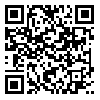Volume 17, Issue 1 (3-2023)
payavard 2023, 17(1): 1-14 |
Back to browse issues page
Ethics code: IR.UMSHA.REC.1401.917
Download citation:
BibTeX | RIS | EndNote | Medlars | ProCite | Reference Manager | RefWorks
Send citation to:



BibTeX | RIS | EndNote | Medlars | ProCite | Reference Manager | RefWorks
Send citation to:
Dehghani A, Ghanbari Khoshnood M, Amini Sarteshnizi S, Farhadi A. Examining the Life Experience in Students of Hamadan University of Medical Sciences toward E-Learning in Covid-19 Crisis: A Study with Phenomenological Approach. payavard 2023; 17 (1) :1-14
URL: http://payavard.tums.ac.ir/article-1-7201-en.html
URL: http://payavard.tums.ac.ir/article-1-7201-en.html
1- Ph.D. Candidate in Health Education and Health Promotion, Faculty of Health, Mashhad University of Medical Sciences, Mashhad, Iran
2- Librarian, Parvinetesami Library, Hamadan, Iran ,maryamghanbaripl@gmail.com
3- Librarian, Shahid Ghodosi Library, Kiyashahr, Iran
4- Master of Science in Medical Information Science, Faculty of Paramedical, Hamadan University of Medical Sciences, Hamadan, Iran
2- Librarian, Parvinetesami Library, Hamadan, Iran ,
3- Librarian, Shahid Ghodosi Library, Kiyashahr, Iran
4- Master of Science in Medical Information Science, Faculty of Paramedical, Hamadan University of Medical Sciences, Hamadan, Iran
Abstract: (1303 Views)
Background and Aim: The emergence and continuity of Corona has forced universities and higher education centers to change their educational strategy to take appropriate and consistent action to improve their educational programs. Due to the importance of e-learning and e-learning in response to these conditions, the present study investigated the experience of students of Hamadan University of Medical Sciences from e-learning in the Covid-19 crisis condition.
Materials and Methods: This was a qualitative research with an interpretive phenomenological approach. The purposeful sampling method was used. Semi-structured interviews were used to collect data. After the thirteenth interview, the theoretical saturation of the data was achieved and the interview process with the sixteenth person was completed. In order to analyze the text of the interviews, the Colaizzi method was used.
Results: From the analysis of the obtained data, three main themes: “Communication and interaction” with five sub-themes (lack of proper interaction between student/professor and student/student, lack of motivation, security and mental health, knowledge sharing and efficiency atmosphere in time and cost), “Management of time and learning style” with six sub-themes (low quality of teaching, stress, access and provision of resources, exam health, gaining experience and skills and opportunity to learn again and innovation in education) and “Infrastructure and technical facilities” were extracted with three sub-themes (weak support, ignoring educational equality and promoting media literacy). Weak interaction between professor and student, increasing level of anxiety and individual responsibility to achieve success in learning and weak technical and management infrastructure were the main challenges obtained from these three themes. Providing a platform for research, self-regulation and self-management in learning, increasing the knowledge and skills of information and communication technology are among the opportunities that are included in these themes.
Conclusion: The results of the current research require attention to the approach of interaction and communication between the learner and the learner, to review the methods of teaching and skill-learning, to improve the quality of electronic learning and to prepare suitable infrastructures for optimal use of electronic learning.
Materials and Methods: This was a qualitative research with an interpretive phenomenological approach. The purposeful sampling method was used. Semi-structured interviews were used to collect data. After the thirteenth interview, the theoretical saturation of the data was achieved and the interview process with the sixteenth person was completed. In order to analyze the text of the interviews, the Colaizzi method was used.
Results: From the analysis of the obtained data, three main themes: “Communication and interaction” with five sub-themes (lack of proper interaction between student/professor and student/student, lack of motivation, security and mental health, knowledge sharing and efficiency atmosphere in time and cost), “Management of time and learning style” with six sub-themes (low quality of teaching, stress, access and provision of resources, exam health, gaining experience and skills and opportunity to learn again and innovation in education) and “Infrastructure and technical facilities” were extracted with three sub-themes (weak support, ignoring educational equality and promoting media literacy). Weak interaction between professor and student, increasing level of anxiety and individual responsibility to achieve success in learning and weak technical and management infrastructure were the main challenges obtained from these three themes. Providing a platform for research, self-regulation and self-management in learning, increasing the knowledge and skills of information and communication technology are among the opportunities that are included in these themes.
Conclusion: The results of the current research require attention to the approach of interaction and communication between the learner and the learner, to review the methods of teaching and skill-learning, to improve the quality of electronic learning and to prepare suitable infrastructures for optimal use of electronic learning.
Type of Study: Original Research |
Subject:
Medical Library & Information Sciences
ePublished: 1399/07/23
ePublished: 1399/07/23
Send email to the article author
| Rights and permissions | |
 |
This work is licensed under a Creative Commons Attribution-NonCommercial 4.0 International License. |





